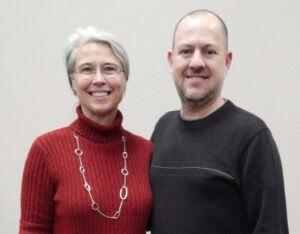Speaking Of Life 4007 | God’s Whistle
In this episode, Greg shares a nostalgic memory from his childhood. Chances are you have a certain sound that takes you back to your youth; where it be a phone call ringtone, grandpa’s familiar car engine rumbling as it arrives in the garage, or a simple term of endearment from mom. We can easily get lost through the chaos of life but just like that familiar whistle, God calls us into his kingdom and find peace beside him.
Speaking Of Life 4007 | God’s Whistle
Greg Williams
I can still hear dad’s whistle or mom’s call from the back porch when it was time to come home from spending the day outside. It’s a sound from a simpler time—when we worked and played outside until the sunset and were back out in the morning to watch it rise. That sound always meant it was time to come home.
Every child who hears that call knows which home to go to. We recognized the call because we knew who was making the call.
I see a similarity in the book of Isaiah. Here I see God calling to his children—not only reminding them where they are from, but whose they are. Reinforcing that they are part of his story.
Note Isaiah’s words in chapter 43:
But now thus says the Lord, he who created you, O Jacob, he who formed you, O Israel: “Fear not, for I have redeemed you; I have called you by name, you are mine. When you pass through the waters, I will be with you; and through the rivers, they shall not overwhelm you; when you walk through fire you shall not be burned, and the flame shall not consume you.
Isaiah 43:1-2 (ESV)
You are mine, he says, and I will always be with you—even walking through fire with you. And when you go out on your own… Notice this next part when he says he will whistle them home…
Fear not, for I am with you; I will bring your offspring from the east, and from the west I will gather you. I will say to the north, Give up, and to the south, Do not withhold; bring my sons from afar and my daughters from the end of the earth,
Isaiah 43:5-7 (ESV)
Israel did not stay true to God’s covenant and was carted away from home. They came to exile in Babylon. There they settled and became somewhat comfortable in exile. But true to his word, God called them to remember who he was, who they were in him, and to leave Babylon and come home.
Like a parent’s voice that reminds us who we are and where we’re from, God reminds them of their story. He whistles for them to come home.
Do you hear the echoes in this story? This is creation itself—he created you, he formed you. Then the next story—”when you pass through the waters, I will be with you,”—this is the exodus story.
God is reminding them who they are and calling them back home from the four corners of the earth.
Has God called to you like this? He is whistling you home. He’s calling you to come out of this disorienting, scattered world and return home to your story. Back to the story, he’s writing for you.
He’s calling you to be who you truly are—the beloved royal child of God. It’s time to respond to the whistle and come home.
This is Greg Williams, Speaking of Life.
Psalm 29:1-11 · Isaiah 43:1-7 · Acts 8:14-17 · Luke 3:15-17; 21-22
This week’s theme for this Baptism of the Lord Sunday is the voice of God. The call to worship Psalm describes the power of the Lord’s voice over the forces of the natural world. Isaiah 43 tells the story of God’s voice gathering the family of Israel to bring them home. Acts 8 tells us of the Spirit and word of God crossing old divisions between people. Our sermon is on Luke 3, and the climax of the story is God speaking at Jesus’ baptism.
Made Extraordinary by Jesus
Luke 3:15-17, 21-22
Read, or have someone read Luke 3:15-17, 21-22, prior to the sermon.
Have you ever been so committed to a cause or relationship that you felt nothing could stop you? We only get a few of those moments—falling in love, going on a mission trip, having kids, finding our vocation—that fill our veins with purpose. You find yourself with strength you never knew you had. Boldness, stamina, focus seem to come out of nowhere. For a few moments, you seem to walk on air.
These supercharged connections are some of life’s great blessings and we only get so many. It’s like you don’t need to sleep or eat anymore. You are consumed with purpose.

John the Baptist was consumed with purpose. By the time we see him, he’s in the white-hot center of his vocation, living in the desert, wearing rags. He has a singular focus. Today we’ll look at Jesus’ baptism and John’s part—or lack of part—in it. We’ll look at how John’s vocation gave way to Jesus’ vocation and the beginning of the adventure we call the gospel—our vocation.
The vocation of John
One of the first things we hear John say is:
…but he who is mightier than I is coming, the strap of whose sandals I am not worthy to untie. (Luke 3:16 ESV)
John refers here to the slave’s work of untying someone’s sandals. Slaves were everywhere in the ancient world, and since everyone wore sandals, this would have been a common situation in those days and one of the lower duties of being a slave.
John says he isn’t worthy to do this for Jesus. This is a verse we are familiar with, but it would sound completely strange to them. John looked to them like a prophet—one of God’s messengers they hadn’t heard from in centuries. They even thought he might be the long-awaited Messiah. He looked like everything they’ve been waiting for. And one of the first things he says is, “I’m not your guy.”
This is an important moment. John embodied everything they’d come to expect about God moving. He ate, dressed and talked like Elijah, the prophet hero of their culture. And he says, It’s not me.
This meant that the new movement of God wasn’t going to look like the old movement. The prophets of all the centuries, symbolized by John in this moment, were not even worthy to approach Jesus, only to point to him. Then they are to leave the stage.
The Gospel of John portrays the Baptist saying this with its trademark stylistic language: “He who comes after me ranks before me, because he was before me” (John 1:15 ESV). John the Baptist is a prophet just like the prophets of old, but he is not here to declare political victory for Israel, nor is he here to declare the age of military peace and harmony. John is here, like the prophets, to declare the entrance of God.
We’ve seen this in our own lives as well. Think of all the times that we’ve been doing things like we always do, business as usual, and Jesus arrives on the scene in a new way. Maybe you’ve been praying for someone, and you see that prayer start to take hold and their life and situation start to change. Are you ready to walk away and give the glory to God? Or will you steal the moment for yourself?
Maybe you’ve been pouring yourself into someone’s life who is just learning about faith, and you see the Spirit take hold of them. They are given the energy and insight and freedom that comes with Jesus being present. Will you bask in that moment, congratulating yourself for your evangelism efforts, or will you join in the greater glory of giving that honor to God? Will you watch them grow, even surpass you, and be used by God to do great things, or will you sink into jealousy?
At the same time, we’ve seen that rush of faith in our own lives: The way we used to do things has passed away; behold the new has come. Over and over we see this throughout our faith lives, as we grow from “glory to glory,” as Paul put it (2 Corinthians 3:18, KJV). We see the old way we were doing things no longer working. The old gossip sessions ring hollow, the drinking doesn’t give us the same escape, we start to see our enemies as three-dimensional people with their own problems – it is the approach of Christ, and he’s burning the chaff off of you. Behold, the new has come.
The footnote to this is that our lectionary reading this week actually leaves out a few verses. Luke interjects the story of John’s imprisonment by Herod right in the middle of this. It’s a strange interlude, and some people believe it was added in later.
But I believe it was there from the beginning. John’s imprisonment and death was tragic, but in the end, he wanted nothing more. His disappearance from the stage was certain to be violent, and the contrast is vivid. The old way, represented by John, is dead and the new way, Jesus, is alive and unkillable.
The vocation of Jesus
Now when all the people were baptized, and when Jesus also had been baptized and was praying, (Luke 3:21 ESV)
When scholars approach this moment in Scripture, they often question why Jesus was baptized at all. John’s baptism, as is said in other places, is a baptism of “repentance.” It is a baptism of renewal and realignment with the purposes and character of God. It’s a revival of law-keeping and walking away from sin.
The issue arises: Jesus never sinned, so why is he being baptized? He’s the sinless Lord, why would he need the baptism of repentance? He wrote the law, so why would he need to re-declare his allegiance to it?
We need to think about the purpose of John’s baptism with a little more dimension. Yes, he was offering them a way to declare their allegiance and turn away from sin, but all that was part of declaring they were part of what God was up to. John the Baptist is orienting them toward God, calling them to pass through the waters, as the ancient Israelites did on their way to the promised land.
Jesus comes not as the detached observer or the gloved surgeon to the human story. He dives right in. For him to join in the baptism was for him to declare that he was not only one with God’s purposes and movement in the world; he was declaring that he, as the Son of Man, is one with us.
Baptism, especially as John practiced it by immersing people in water, is a bit like death. It’s meant to be. We are never quite so helpless as we are when we’re underwater—we can’t breathe, and we have to trust the person who put us in there to get us back out. When we rise from the water, we are wet—mascara-streaked, toupee floating on the surface behind us. We are humble and fresh and a bit helpless, like a newborn baby.
For Jesus to participate in this death and re-birth was for him to declare himself part of the pathetic and beautiful story of humanity. He wasn’t baptized just into water; he was baptized into us.
This fact can be an immense comfort to us. When God became one of us, he didn’t take the easy track. You can’t read more than a paragraph of Jesus’ life in which he wasn’t challenged, exhausted, misunderstood and finally killed. For him to be baptized into the human condition meant that he was immersed in the fatigue, boredom and heartbreak that comes with it. Remember, “Jesus wept” (John 11:35).
The heavens were opened, and the Holy Spirit descended on him in bodily form, like a dove; and a voice came from heaven, “You are my beloved Son; with you I am well pleased.” (Luke3:21-22 ESV)
Jesus’ baptism was a frighteningly vivid Trinitarian moment. The Father, Son and Holy Spirit are there right next to each other. Luke tips his hat in several directions to the Old Testament writers, accenting the different imagery present.
- The heavens are opened – This is similar phrasing to the description of the Genesis flood; the heavens being opened and torrents of rain coming down.
- The dove descends – This is an allusion to the dove returning to Noah after the flood with the olive branch in its mouth, showing him that the flood was receding, and the promise was coming to be.
- I am well-pleased – Here Luke echoes the Genesis account, in which God says over and over that “it is good” and he was well-pleased with all he created.
All this Genesis imagery in one place speaks about Jesus’ vocation—re-creation. Jesus’ “job” is not just to do everything better, but to start it over. There are several examples of this kind of Genesis language used about Jesus. God is starting over again—like the flood, like the original creation—giving us a new heart and putting his own Spirit in us.
One early indicator of the kind of world Jesus is re-creating is with John himself. Jesus is making a world in which the last shall be first, and the weak will be made strong. He’s making a world in which a powerful, popular figure like John lives his whole life to introduce Jesus and disappear. John is one of the first residents of the new Jesus world. Instead of living for himself and his own ego, he lives only to introduce Jesus and then immediately go to the sidelines.
What freedom! John is one of the first to be made “free indeed” by Jesus, delivered from his own ego and drawn into God’s amazing purpose. This is the “upside down kingdom” of Jesus. Instead of being slaves to our insatiable egos, God delivers us to be part of his great plan. Instead of status, he gives us purpose; instead of solitary narcissism, he invites us to be part of a family. He is re-creating, making all things new, and that includes the way we as human beings interact with each other and treat ourselves.
Your vocation
Theologian Frederick Buechner said it beautifully: “The place God calls you to is the place where your deep gladness and the world’s deep hunger meet.” This is about vocation—which comes from the root word “vocal,” meaning calling. This is much more than your job, although it can include your job, but it is what God has called you to in his overarching purpose in humanity—the meeting of your gladness and the world’s deep hunger.
That vocation can mean a history-shaking post like John the Baptist or Billy Graham or Corrie Ten Boom. It can also mean joyfully serving that special-needs child or overcoming the abuse you’ve endured in your life by stopping the cycle and showing kindness. Those moments of vocation can bring you to the rugged strength of John the Baptist, the unflinching obedience of Peter, the joyful participation of Mary. These were not extraordinary people. They were made extraordinary by Jesus.
Where is the extraordinary he’s calling you to today?
Questions for Sermon “Made Extraordinary by Jesus”
- Do you feel that you’ve found the vocation that God called you to, even if just for a moment? Remember, vocation doesn’t mean job per se, but could be parenting, leading a ministry, volunteering, etc.
- Do you think it was difficult for John the Baptist to “disappear” after Jesus arrived? How do we know, when Jesus is not with us bodily, that he has “arrived”? What indicates that?
- What does it mean for Jesus to “re-create” us? Have you seen him redeem what you thought was lost in your own life?
Questions for Speaking of Life: “God’s Whistle — Isaiah 43”
- Did one of your parents have a call or a whistle that brought you home at night? Do you have one for your kids? (Share stories)
- How does God call us back to our story, to who we truly are when we get distracted by a loud, driven world?
- Why does God continually call us into fellowship with each other? Why can’t we do faith on our own?
Quote to ponder:
“Neither the hair shirt nor the soft berth will do. The place God calls you to is the place where your deep gladness and the world’s deep hunger meet.” ~~Frederick Buechner



 By Tim Sitterley, US Regional Director, West
By Tim Sitterley, US Regional Director, West
 By Bob Regazzoli, pastor, Australia
By Bob Regazzoli, pastor, Australia
 By Eugene Guzon, Superintendent of Asia
By Eugene Guzon, Superintendent of Asia



 “He is the source of all the good things that we are trying to build, like the Faith Avenue in this instance. And our job is to connect with him, he’s doing the heavy lifting and he will produce the results that we want to see. We can just rest in that. “
“He is the source of all the good things that we are trying to build, like the Faith Avenue in this instance. And our job is to connect with him, he’s doing the heavy lifting and he will produce the results that we want to see. We can just rest in that. “




